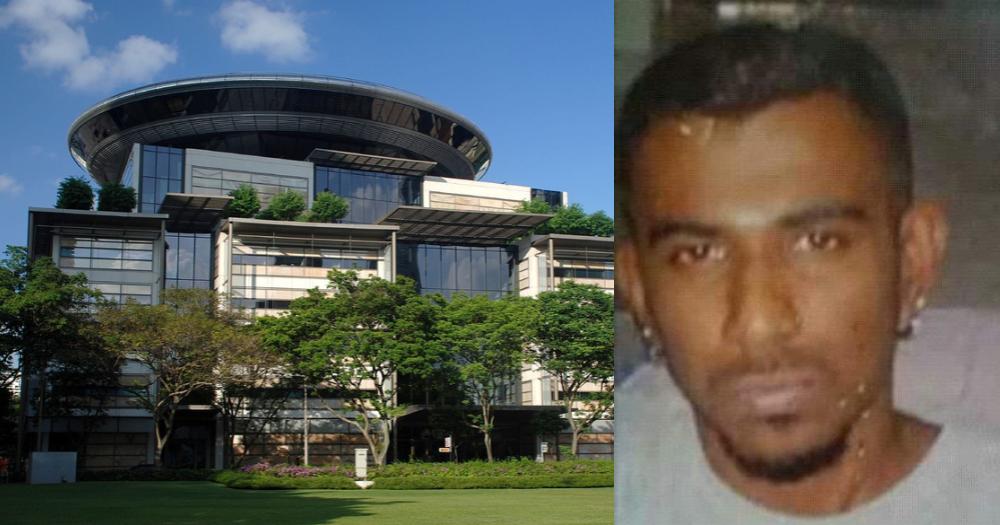Follow us on Telegram for the latest updates: https://t.me/mothershipsg
Nagaenthran A/L K Dharmalingam, who was sentenced to death for smuggling heroin into Singapore, has been granted a temporary stay of execution, pending one more appeal to Singapore's highest court, the Court of Appeal.
The granting of a stay comes two days ahead of the Malaysian's execution, which was scheduled for Nov. 10, 2021.
Why has a stay of execution been granted?
Nagaenthran's lawyer, M Ravi, argued before the High Court that executing Nagaenthran would be unconstitutional.
According to updates on M Ravi's Facebook page, the High Court heard Ravi's constitutional challenge on Nov. 8. But it was dismissed.
However, Ravi said that the High Court also granted a stay of execution, pending an appeal against its decision today.
The appeal will be made to the Court of Appeal, seeking a decision from the apex court to overturn the High Court decision.
What are the legal arguments?
Ravi shared screenshots of his submissions to the High Court via Facebook.
The submissions said there was evidence that Nagaenthran has "severe mental disabilities", and highlighted that Nagaenthran's IQ score was 69, and claimed that he potentially has a mental age of less than 18.
The submissions also claimed that "the Plaintiff [Nagaenthran] does not appear to understand what is happening to him in respect of the impending execution of his sentence of death".
Based on this, the submissions contained arguments that the execution was unconstitutional, among others.
The submissions also sought "additional time to procure the relevant psychiatric examinations and reports to examine the Plaintiff's general mental competence for execution."
AGC: Ravi's evidence "contrary to the objective facts"
The Attorney General's Chambers (AGC) issued a Nov. 8 statement, saying that Ravi's evidence regarding Nagaenthran's mental age was "contrary to the objective facts".
It highlighted how a prison officer who observed Nagaenthran for "close to three years" and interacts "frequently" with him testified in court on Nov. 8 that Nagaenthran did not demonstrate "any abnormal behaviour" and had "no problems communicating" in three languages, making requests and responding to instructions.
The officer also testified that Nagaenthran had "confirmed that he understood" that the sentence of death would be carried out in the near future when notified, and "took active steps to arrange his personal affairs" by requesting for religious counselling, for calls and visits with his family, for his choice of prison officers to attend to his needs leading up to the execution, and so on.
The officer also testified that he was "able to provide contact numbers of relatives and even a childhood friend whom he had not contacted for some time," according to AGC's statement.
It added, "In the context of making these arrangements, Nagaenthran had emphasised to the SPS (Singapore Prison Service) officer that he had a short time left to live."
"No credible basis" for assertions about mental age
It also pointed out that the High Court found "no credible basis" for Ravi's assertions about Nagaenthran's mental age, given that there was no legal basis for Ravi's belief or opinion to be taken as evidence.
"Ravi himself conceded that he possesses no medical expertise to comment on this matter," said AGC's statement.
AGC: Ravi objected to production of latest medical records
AGC said that Nagaenthran "undergoes regular medical and psychiatric assessments in prison," and that it had reached out to Ravi to seek Nagaenthran's consent to disclose records of his latest assessments to the court, in view of possible doctor-patient confidentiality.
It had also sent Ravi copies of the reports, but Ravi did not reply to AGC's letter.
AGC also said that Ravi "made no attempt to take instructions from Nagaenthran on this issue."
"In fact, Mr Ravi has not seen or spoken to Nagaenthran again after his brief 26-minute meeting on 2 November 2021," said AGC's statement.
AGC also pointed out that Ravi was offered an opportunity to see the reports and take instructions from his client via video call in court today (Nov. 8), which he rejected.
"When asked by the Court if he was objecting to the production of the records, Mr Ravi confirmed that he was," said AGC's statement.
Execution could potentially still proceed as scheduled
AGC also confirmed that the appeal would be heard at 2:30pm tomorrow, Nov. 9.
This means the execution could potentially proceed as scheduled on Nov. 10, should the Court of Appeal not rule in Nagaenthran's favour.
Background on Nagaenthran's case
Nagaenthran was first convicted and sentenced to death in November 2010, after he was caught with a bundle of diamorphine, or heroin, strapped to his thigh in 2009.
Appeals against his conviction and sentence were dismissed by the Court of Appeal in Jul 2011.
After the death penalty regime under the Misuse of Drugs Act was amended, a re-sentencing application was made, and dismissed by the High Court on Sep. 2017.
A further appeal against this decision, as well as a separate judicial review application, were dismissed in May 2019.
A petition to the President for clemency was also unsuccessful.
The case has been in the limelight for the last few weeks as human rights groups called attention to his intellectual disability and IQ of 69, attracting international media coverage.
Malaysia's Prime Minister also sought leniency on Nagaenthran's behalf, writing directly to Singapore Prime Minister Lee Hsien Loong.
Related stories:
Top photo via Wikimedia Commons and via M Ravi on Facebook.
Follow and listen to our podcast here
If you like what you read, follow us on Facebook, Instagram, Twitter and Telegram to get the latest updates.
